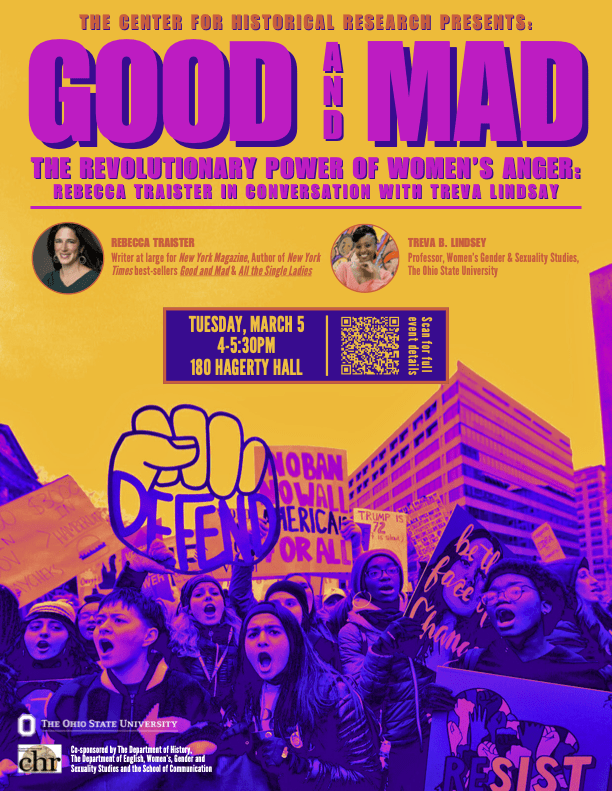
“Good and Mad: The Revolutionary Power of Women’s Anger: A Conversation with Rebecca Traister” will take place Tuesday in 180 Hagerty Hall from 4-5:30 p.m. Credit: Courtesy of Amanda Budreau
Although the concept of “feminine rage” has gained modern-day relevance in the discussion of artistic mediums like film and song, such anger has deep historical roots.
As part of its ongoing “Anger in History” lecture series, the Ohio State Center for Historical Research — an organization that brings scholars together to analyze contemporary issues through a historical perspective — will present “Good and Mad: The Revolutionary Power of Women’s Anger: A Conversation with Rebecca Traister” Tuesday in 180 Hagerty Hall from 4 to 5:30 p.m. This installment of the series is aimed at addressing both how anger is negatively viewed in society and how it can be reframed as a positive and powerful force, the center’s website states.
The event will consist of a conversation between Traister, a writer for New York Magazine, and Treva B. Lindsey, an Ohio State professor of women’s, gender and sexuality studies, surrounding Traister’s New York Times bestselling book, titled “Good and Mad: The Revolutionary Power of Women’s Anger,” the website states.
“The book is this kind of an incredible analysis of the use of what she identifies as kind of an un-feminine emotion — anger — that women are often punished or said we’re too irrational [for], but really putting anger at the center of an analysis of some of the most important social and political movements in our nation’s history,” Lindsey said.
In accordance with the themes of Traister’s book, Lindsey said people should consider the context surrounding major historical events that were spurred by anger in order to truly grasp the emotion’s impact.
“I think it’s really important to understand historical narratives and social movements by understanding both the emotional registers that they exist in as well as how they contribute to the execution of mobilization, of organizing, of getting people to form a collective and form a community around a particular issue,” Lindsey said.
Sara Butler, the center’s director as well as professor and King George III Chair in British History, said the event intends to shed light on the gender-based differences in society’s perceptions of anger.
“Men’s anger is something that can be seen in a very positive light as an agent of change,” Butler said. “Whereas, when women are angry, they’re seen as bitter, resentful and their anger is generally seen as unproductive.”
Butler said she hopes the lecture will help change that harmful narrative.
“Part of what we wanted to do was to host this series to look to the past and realize that actually, there have been a lot of moments when anger has been productive,” Butler said. “It doesn’t have to be a terrible thing.”
Lindsey said she hopes students in particular will find this subject matter interesting. Ideally, she said the talk will help them adopt strategies to constructively cope with rage when laying the foundation for the future.
“We’re intrigued by rage, but we’re also dismissive of it, and I hope that this gives us a place to anchor in that isn’t as dismissive of rage but actually sees what rage [does] generate,” Lindsey said.
Nevertheless, Butler said the lecture is geared toward a wide-ranging audience, intended not only for Ohio State students but also for the broader Columbus community.
“This is something that we’re really hoping will appeal to an undergraduate audience out there, and will appeal to people off campus who are excited,” Butler said. “For example, we’ve sent a lot of emails out to various women’s groups in the area to make sure that they know about this.”
Butler also said she hopes the event will generate a substantial male audience.
“Quite frankly, I think a lot of male students should go up there and get a bit more of a sense of why some women are really upset these days, what’s going on and how they can make a difference, too,” Butler said.
Although the present political climate may be tumultuous, events like these help attendees remember that history has seen similar periods that were ultimately transformative for society, Butler said.
“I think that we all need to be inspired,” Butler said. “I think we also need to be reassured that we’re not necessarily heading in a terrible direction.”
More information about the event and the broader “Anger in History” lecture series — including the required registration form — can be found on the center’s website.


